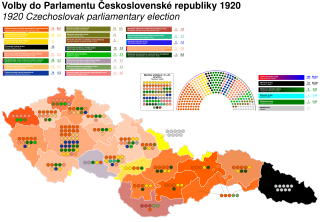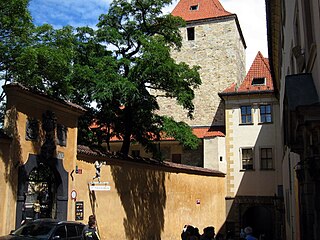
Charles University, or historically as the University of Prague, is the largest university in the Czech Republic. It is one of the oldest universities in the world in continuous operation, the first university north of the Alps and east of Paris. Today, the university consists of 17 faculties located in Prague, Hradec Králové, and Plzeň.

Czech National Social Party is a nationalist political party in the Czech Republic, that played an important role in Czechoslovakia during the interwar period. It was established in 1897 by break-away groups from both the national liberal Young Czech Party and the Czech Social Democratic Party, with a stress on achieving independence of the Czech lands from Austria-Hungary. Its variant of socialism was moderate and reformist rather than a Marxist one. After the National Labour Party dissolved and merged with National Socialists in 1930, the party also became the refuge for Czech liberals. Its best-known member was Edvard Beneš, a co-founder of Czechoslovakia and the country's second President during the 1930s and 1940s.

The Imperial Council was the legislature of the Austrian Empire from 1861 until 1918. It was a bicameral body: the upper house was the House of Lords, and the lower house was the House of Deputies. To become law, bills had to be passed by both houses, signed by the government minister responsible, and then granted royal assent by the Emperor. After having been passed, laws were published in the Reichsgesetzblatt. In addition to the Imperial Council, the fifteen individual crown lands of Cisleithania had their own diets.
This article gives an overview of liberalism in the Czech Republic. It is limited to liberal parties with substantial support, mainly proved by having had a representation in parliament. The sign ⇒ denotes another party in that scheme. For inclusion in this scheme it is not necessary that parties label themselves as a liberal party.

German Bohemians, later known as Sudeten Germans, were ethnic Germans living in the Czech lands of the Bohemian Crown, which later became an integral part of Czechoslovakia. Before 1945, over three million German Bohemians constituted about 23% of the population of the whole country and about 29.5% of the population of Bohemia and Moravia. Ethnic Germans migrated into the Kingdom of Bohemia, an electoral territory of the Holy Roman Empire, from the 11th century, mostly in the border regions of what was later called the "Sudetenland", which was named after the Sudeten Mountains.

Karel Baxa was a Czech politician in Austro-Hungarian Monarchy and then in Czechoslovakia. He is most known for his long term position as mayor of Prague.

Parliamentary elections were held in Czechoslovakia on 18 and 25 April 1920. Members of the Chamber of Deputies were elected on 18 April and members of the Senate on 25 April. The elections had initially been planned for mid- or late 1919, but had been postponed.

Parliamentary elections were held in the Czech Republic on 28–29 May 2010 to elect the 200 members of the Chamber of Deputies. The elections had been expected to take place sometime before the end of 2009, but was postponed due to legal challenges. Before the election, the country had been governed by a caretaker administration headed by Jan Fischer. The Czech Social Democratic Party (ČSSD) was the front-runner of the election and its leader Jiří Paroubek was the favourite to become the new prime minister.

Prof. PhDr. Zdeněk Kárník, DrSc. was a Czech historian and pedagogue.

Legislative elections to elect members of the Imperial Council were held in Cisleithania, the Austrian section of Austria-Hungary over several days in June and July 1911. A coalition of German national and liberal parties, the Deutscher Nationalverband, emerged as the largest bloc in Parliament, holding 100 of the 516 seats. Voter turnout was 80.2%.
The German People's Party was a political party of the German-speaking group in the Cisleithanian part of the Austro-Hungarian Empire. It was founded in 1896 as a successor to the German National Party and was led by Otto Steinwender.

Legislative elections to elect the members of the ninth Imperial Council were held in March 1897 in Cisleithania, the northern and western ("Austrian") crown lands of Austria-Hungary. These elections were first in Cisleithania held under the curial system with universal, but still not equal, suffrage.

A leadership election was held within the Czech Social Democratic Party (ČSSD) on 25 March 1990. It was the first leadership election since the party's re-establishment and saw Jiří Horák defeat Rudolf Battěk. Battěk was supported by exiled politicians from the party, and wanted ČSSD to run in the 1990 parliamentary elections as part of the Civic Forum list, while Horák wanted the party to run independently.
Václav Chaloupecký was a Czech historian, a student of prominent Czech historian Josef Pekař and the main representative of historians in mid-war Slovakia.

The 1968 Czechoslovak presidential election took place on 30 March 1968. Ludvík Svoboda replaced Antonín Novotný as the President of Czechoslovakia. It was the only time during Communist regime that the elected president didn't receive 100% of votes.

Legislative elections were held in Cisleithania in 1891 to elect the members of the eighth Imperial Council. They were the last elections in Cisleithania before the Badeni electoral reform, which drastically increased male suffrage. The German Liberal and Constitutional Party received 32.81% of the vote.

Národní sdružení odborových organizací was a trade union centre in the Czechoslovakia. Politically it was linked to the right-wing Czechoslovak National Democratic Party. The centre was organized by the former socialist Josef Hudec. As of 1929 organization was divided in 7 sections and had 304 branches.

Jan Helcelet was a Czech naturalist, journalist, revolutionary and politician. He was one of the leaders of the Old Czech Party in Moravia.

The Prague uprising, also known as the Pentecostal Storm, was an armed conflict on 12–17 June 1848 in Prague, which culminated in the revolutionary process in the Czech lands. The uprising was a spontaneous unprepared uprising, which was suppressed by the army and killed about 43 people.

The Supreme Burgrave of the Kingdom of Bohemia, originally the Burgrave of Prague or the Burgrave of Prague Castle was the most important land official of the Kingdom of Bohemia. They were the head of the Bohemian Diet and the Bohemian land court, and commander of the Zemská hotovost.




















